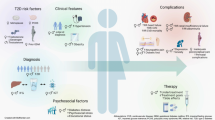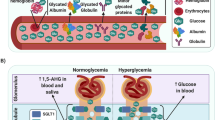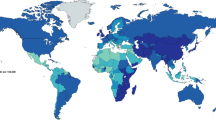Abstract
Colorectal cancer (CRC) is the third most commonly diagnosed carcinoma and the fourth leading cause of carcinoma deaths worldwide. Most cases of CRC occur in people aged over 50 years, often coexisting with other chronic diseases including obesity, type 2 diabetes mellitus, and cardiovascular disease. Diabetes mellitus (DM) and cancer frequently coexist. DM is associated with an increased risk for pancreatic, gastric, liver, colorectal, breast, urinary tract, and female reproductive cancers. It is hypothesized that possible biologic links between diabetes and cancer risk could be related to hormonal (insulin resistance), inflammatory, or metabolic (hyperglycemia) characteristics of DM, as well as with some antidiabetic medications. This review summarizes the current published literature regarding the association of CRC with diabetes since there is growing evidence from recent studies that this association is not random.
Similar content being viewed by others
References
McGuire S. World Cancer Report 2014. Geneva, Switzerland: World Health Organization, International Agency for Research on Cancer, WHO Press, 2015. Adv Nutr. 2016;7:418–9.
American Cancer Society. Cancer facts & figures, 2013. Atlanta: American Cancer Society; 2013.
Allen JI. Molecular biology of colon polyps and colon cancer. Surg Oncol. 1995;11:399–405.
Winawer SJ, Zauber AG, Ho MN, O’Brien ML, et al. Prevention of colorectal cancer by colonoscopic polypectomy. The National Polyp Study Workgroup. N Engl J Med. 1993;329:1977–81.
Levin B, Lieberman DA, McFarland B, Andrews KS, Brooks D, Bond J, et al. American Cancer Society Colorectal Cancer Advisory Group, US Multi-Society Task Force, American College of Radiology Colon Cancer Committee. Screening and surveillance for the early detection of colorectal cancer and adenomatous polyps, 2008: a joint guideline from the American Cancer Society, the US Multi-Society Task Force on Colorectal Cancer, and the American College of Radiology. Gastroenterology. 2008;134:1570–95.
Hixson LJ, Fennerty MB, Sampliner RE, McGee D, Garewal H. Prospective study of the frequency and size distribution of polyps missed by colonoscopy. J Natl Cancer Inst. 1992;82:1769–72.
Sakkinen PA, Wahl P, Cushman M, Lewis MR, Tracy RP. Clustering of procoagulation, inflammation, and fibrinolysis variables with metabolic factors in insulin resistance syndrome. Am J Epidemiol. 2000;152:897–907.
Reilly MP, Rader DJ. The metabolic syndrome: more than the sum of its parts? Circulation. 2003;108:1546–51.
Giovannucci E. Metabolic syndrome, hyperinsulinemia, and colon cancer: a review. Am J ClinNutr. 2007;86(suppl):836S–42S.
Lovic D, Stojanov V, Jakovljević B, et al. Prevalence of arterial hypertension in Serbia: PAHIS study. J Hypertens. 2013;31:2151–7.
Gerber M, Corpet D. Energy balance and cancers. Eur J Cancer Prev. 1999;8:77–89.
Lovic D, Erdine S, BurakÇatakoǧlu A. How to estimate left ventricular hypertrophy in hypertensive patients. Anadolu Kardiyoli Derg. 2014;14:389–95.
Epidemiology of colorectal cancer revisited: are serum triglycerides and/or plasma glucose: associated with risk? Cancer Epidemiol Biomarkers Prev. 1994;3:687–95.
Xu CX, Zhu HH, Zhu YM. Diabetes and cancer: associations, mechanisms, and implications for medical practice. World J Diabetes. 2014;5:372–80.
Ontilo AA, Engel JM, Glurich I, Stankowski RV, Williams GM, Doi SA. Diabetes and cancer I: risk, survival, and imlications for screening. Cancer Causes Control. 2012;23:967–81.D.
Giovannucci E, Harlan DM, Archer MC, Bergenstal RM, Gapstur SM, Habel LA, et al. Diabetes and cancer: a consensus report. CA Cancer J Clin. 2010;60:207–21.
García-Jiménez C, García-Martínez JM, Choccaro-Calvo A, De la Vieja A. A new link between diabetes and cancer: enhanced WNT/β-catenin signalling by high glucose. J Mol Endocrinol. 2014;52:R51–66.
Evans JM, Donnelly LA, Emslie-Smith AM, Alessi DR, Morris AD. Metformin and reduced risk of cancer in diabetic patients. BMJ. 2005;330:1304–5.
Libby G, Donnelly LA, Donnan PT, Alessi DR, Morris AD, Evans JM. New users of metformin are at low risk of incident cancer: a cohort study among people with type 2 diabetes. Diabetes Care. 2009;32:1620–5.
Landman GW, Kleefstra N, van Hateren KJ, Groenier KH, Gans RO, Bilo HJ. Metformin associated with lower cancer mortality in type 2 diabetes: ZODIAC-16. Diabetes Care. 2010;33:322–6.
Bruce WR, Wolever TM, Giacca A. Mechanism linking diet and colorectal cancer. The possible role of insulin resistance. Nutr Cancer. 2000;37:19–26.
Roberts DL, Dive C, Renehan AG. Biological mechanisms linking obesity and cancer risk: new perspectives. Annu Rev Med. 2010;61:301–16.
Colangelo LA, Gapstur SM, Gann PH, Dyer AR, Liu K. Colorectal cancer mortality and factors related to the insulin resistance syndrome. Cancer Epidemiol Biomark Prev. 2002;11:385–91.
Djiogue S, NwaboKamdje AH, Vecchio L, Kipanyula MJ, et al. Insulin resistance and cancer: the role of insulin and IGFs. Endocr Relat Cancer. 2013;20:R1–R17.
Novosyadlyy R, LeRoith D. Hyperinsulinemia and type 2 diabetes: impact on cancer. Cell Cycle. 2010;9:1449–50.
Alvino CL, Ong SC, McNeil KA, Delaine C, et al. Understanding the mechanism of insulin and insulin-like growth factor (IGF) receptor activation by IGF-II. PLoS One. 2011;6:e27488.
Fleming HE, Janzen V, Lo Celso C, Guo J, Leahy KM, Kronenberg HM, et al. Wnt signalling in the niche enforces hematopoietic stem cell quiescence and is necessary to preserve self-renewal in vivo. Cell Stem Cell. 2008;2:274–83.
Stattin P, Björ O, Ferrari, Lukanova A, et al. Prospective study of hyperglycemia and cancer risk. Diabetes Care. 2007;30:561–7.
Saydah SH, Platz EA, Rifai N, Pollak MN, et al. Association of markers of insulin and glucose control with subsequent colorectal cancer risk. Cancer Epidemiol Biomark Prev. 2003;12:412–8.
Takahashi H, Mizuta T, Eguchi Y, Kawaguchu Y, et al. Post-challenge hyperglycemia is a significant risk factor for the development of hepatocellular carcinoma in patients with chronic hepatitis C. J Gastroenterol. 2011;46:790–8.
Yamasaki K, Hayashi Y, Okamoto S, Osanai M, Lee GH. Insulin-independent promotion of chemically induced hepatocellular tumor development in genetically diabetic mice. Cancer Sci. 2010;101:65–72.
Vigneri P, Frasca F, Sciacca L, Pandini G, Vigneri R. Diabetes and cancer. Endocr Relat Cancer. 2009;16:1103–23.
Johnson JA, Bowker SL. Intensive glycaemic control and cancer risk in type 2 diabetes: a meta-analysis of major trials. Diabetologia. 2011;54:25–31.
Ward PS, Thompon CB. Metabolic reprogramming: a cancer hallmark even Warburg did not anticipate. Cancer Cell. 2012;21:297–308.
Kundu JK, Surh YJ. Inflammation: gearing the journey to cancer. Mutat Res. 2008;659:15–30.
Ono M. Molecular links between tumor angiogenesis and inflammation: inflammatory stimuli of macrophages and cancer cells as targets for therapeutic strategy. Cancer Sci. 2008;99:1501–6.
Moore MM, Chua W, Charles KA, Clarke SJ. Inflammation and cancer: causes and consequences. Clin Pharmacol Ther. 2010;87:504–8.
Matsuda M, Shimomura I. Increased oxidative stress in obesity: implications for metabolic syndrome, diabetes, hypertension, dyslipidemia, atherosclerosis, and cancer. Obes Res Clin Pract. 2013;7:e330–41.
Yang H, Jin X, Kei Lam CW, Yan SK. Oxidative stress and diabetes mellitus. Clin Chem Lab Med. 2011;49:1773–82.
DiDonato JA, Mercurio F, Karin M. NF-kB and the link between inflammation and cancer. Immunol Res. 2012;246:379–400.
Hoesel B, Schmid JA. The complexity of NF-kB signaling in inflammation and cancer. Mol Cancer. 2013;12:86.
Bowker SL, Majumdar P, Veugelers P, Johnson JA. Increased cancer care mortality for cancer-related mortality for patients with type 2 diabetes who use sulfonylureas or insulin. Diabetes Care. 2006;29:254–8.
Monami M, Lamanna C, Balzi D, Marchionni N, Mannucci E. Sulfonylureas and cancer: a case-control study. Acta Diabetol. 2009;46:279–84.
Li D, Yeung SJ, Hassan MM, Konopleva M. Abbruzzese. Antidiabetic affect risk of pancreatic cancer. Gastroenterology. 2009;137:482–8.
Currie CJ, Poole CD, Gale EAM. The influence of glucose-lowering therapies on cancer risk in type 2 diabetes. Diabetologia. 2009;52:1766–77.
Bodmer M, Becker C, Meier C, Jick SS, Meier CR. Use of metformin and the risk of ovarian cancer: a case-control analysis. Gynecol Oncol. 2011;132:200–4.
Rattan R, Ali Fehmi R, Munkarah A. Metformin: an emerging new therapeutic option for targeting cancer stem cells and metastasis. J Oncol. 2012;2012:1–12.
Hirsch HA, Iliopoulos D, Tsichlis PN, Struhl K. Metformin selectively targets cancer stem cells, and acts together with chemotherapy to block tumor growth and prolong remission. Cancer Res. 2009;69:7507–11.
Lee JH, Kim TI, Jeon SM, Hong SP, Cheon JH, Kim WH. The effects of metformin on the survival of colorectal cancer patients with diabetes mellitus. Int J Cancer. 2012;131:752–9.
Jiralerspong S, Palla S, Giordano SH, et al. Metformin and pathologic complete responses to neoadjuvant chemotherapy in diabetic patients with breast cancer. J Clin Oncology. 2009;27:3297–302.
Kim YH, Noh R, Cho SY, Park SJ, Jeon SM, Shin HD, et al. Inhibitory effect of metformin therapy on the incidence of colorectal advanced adenomas in patients with diabetes. Intest Res. 2015;13:145–52.
Cho YM, Ko BM, Kim SH, et al. Does metformin affect the incidence of colonic polyps and adenomas in patients with type 2 diabetes mellitus? Intest Res. 2014;12:139–45.
Tseng CH. Diabetes, metformin use, and colon cancer: a population-based cohort study in Taiwan. Eur J Endocrinol. 2012;167:409–16.1451.
Liu F, Yan L, Wang Z, Lu Y, Chu Y, Li X, et al. Metformin therapy and risk of colorectal adenomas and colorectal cancer in type 2 diabetes mellitus patients: a systematic review and meta-analysis. Oncotarget. 2017;8:16017–26.
Schoen RE, Weissfeld JL, Kuller LH, et al. Insulin-like growth factor-1 and insulin are associated with the presence and advancement of adenomatous polyps. Gastroenterology. 2005;129:464–75.
Elwing JE, Gao F, Davidson NO, Early DS. Type 2 diabetes mellitus: the impact on colorectal adenoma risk in women. Am J Gastroenterol. 2006;101:1866–71.
Kanadiya MK, Gohel TD, Sanaka MR, Thota PN, Shubrook JH. Relationship between type-2 diabetes and use of metformin with risk of colorectal adenoma in an American population receiving colonoscopy. J Diabetes Complicat. 2013;27:463–6.
Vu HT, Ufere N, Yan Y, Wang JS, Early DS, Elwing JE. Diabetes mellitus increases risk for colorectal adenoma in younger patients. World J Gastroenterol. 2014;14:6946–52.
Author information
Authors and Affiliations
Corresponding author
Ethics declarations
Conflict of Interest
Vesna Brzacki, Aleksandar Nagorni, Manolis Kallistratos, Athanasios Manolis, and Dragan Lovic declare no conflict of interest.
Human and Animal Rights and Informed Consent
This article does not contain any studies with human or animal subjects performed by any of the authors.
Additional information
Publisher’s Note
Springer Nature remains neutral with regard to jurisdictional claims in published maps and institutional affiliations.
This article is part of the Topical Collection on Cardiovascular Pharmacology
Rights and permissions
About this article
Cite this article
Brzacki, V., Nagorni, A., Kallistratos, M. et al. Diabetes Mellitus: a Clinical Condition Associated with Metabolic Syndrome and Colorectal Cancer Risk. Curr Pharmacol Rep 5, 205–209 (2019). https://doi.org/10.1007/s40495-019-00183-8
Published:
Issue Date:
DOI: https://doi.org/10.1007/s40495-019-00183-8




